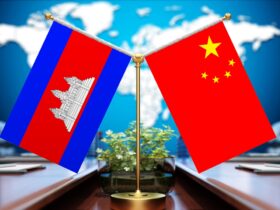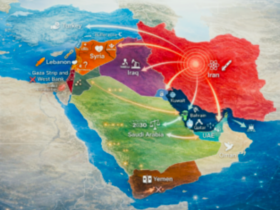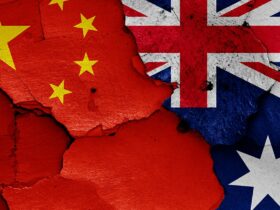By Douglas Bolivar, Caracas / Venezuela
The Bolivarian Republic of Venezuela has been a State party to the Rome Statute since June 7, 2000, recalls at this interview’s beginning the Attorney General of Venezuela, Tarek William Saab.
“The Venezuelan government has supported the mandate given by the States parties to the International Criminal Court (ICC) since its creation,” he remarks.
“Regarding the process called Venezuela I, the Ministry of Public has collaborated from the beginning with the ICC Prosecutor’s Office, providing information and inviting it to visit the country. This is what we did when we visited the prosecutor Fatou Bensouda in The Hague, at the end of 2020”, he adds.
Then, at the end of 2021, the President of the Republic, Nicolás Maduro, signed a Memorandum of Understanding on behalf of the Venezuelan State with the new prosecutor of the Court, Karim Khan.
This signature was given after the visit of prosecutor Khan to Venezuela and his meetings with the highest authorities of the Venezuelan State.
“In this sense, Venezuela has collaborated and will continue to collaborate with the ICC, because we are respectful of international justice.”
“However, we have always made our position clear. We believe that we have provided sufficient elements to the ICC Prosecutor’s Office that demonstrate that under our management, human rights violations committed by police and military officials have been investigated and punished, with the severity established by law.”
“We do not consider that crimes against humanity have occurred in Venezuela within the framework of the high political conflict that the country has experienced. The excesses committed by police and military officials have been investigated and sanctioned, in a framework of high internal and external political violence against the institutions of the Venezuelan State”, the Attorney General says.
How has been the work dynamics betwee the Ministry of Public and the Office of Technical Cooperation (OTC) of the ICC?
“The OTC of the ICC has not been installed yet, so for now we do not have a working dynamic with it.”
“We did have a very positive working relationship with the Office of the United Nations High Commissioner for Human Rights after the visit of High Commissioner Michelle Bachelet, in June 2019. At that time, the signing of a Memorandum of Understanding with the national government was agreep upon, after which an office was established in the country”.
“We had permanent communication with this office and as a result of that dialogue, procedural momentum was given to numerous cases suggested by this office related to deaths in protests, cruel and inhumane treatment, and unlawful deprivation of liberty.”
Similarly, Saab cites that members of that Mission attended the oral and public trial hearings of some of the emblematic cases.
“We believe that a similar relationship can be established with the ICC’s Technical Cooperation Office,” says the Venezuelan attorney general.
Prosecutor Karim Khan says that “Venezuela is not investigating the allegations of fact that underlie the contextual elements of crimes against humanity.” What does this statement allow you to infer as Attorney General?
“It is not clear to me what prosecutor Khan means by that statement. Our mandate as Ministry of Public is established in article 285 of the Constitution of the Republic. In addition to guaranteeing respect for constitutional rights and guarantees in judicial processes, among others, it is up to us to order and direct the criminal investigation of punishable acts.”
“These investigations are based on complaints, whether they are filed before our institution, before a police body or even through social networks. It starts from the basic principle that criminal responsibilities are individual. This is how they are investigated and if elements are collected that accuse accomplices or collaborators in a crime, they are investigated and when the time comes they are charged and then accused.”
“In the framework of the serious street confrontations that took place in 2017, many people refrained from denouncing before national bodies, some went directly to international bodies. In this sense, we have repeatedly requested the ICC Prosecutor’s Office to send us those complaints that have not been processed by us.
“We believe that collaboration with the Prosecutor’s Office should aim to provide us with specific complaints that allow us to investigate possible crimes that have not been investigated to date,” says Saab.
In a few words, Khan says that the Venezuelan State is practically committing a false investigation. What is the opinion of the Public Prosecutor’s Office on this conclusion of the ICC?
“No one who knows the work carried out by the Venezuelan Ministry of Public and the auxiliary justice bodies can affirm that false investigations are being carried out. There are the files, the expert opinions carried out, the interviews with witnesses and victims, the trials and the sentences that demonstrate a work that is highly committed to truth and justice”.
“For this reason, I believe that the installation of the ICC Technical Cooperation Office will be important, which we hope will take place in the coming months. We believe that their presence in the country will be beneficial, since their delegates will be able to see first-hand how the Public Ministry works, how complaints are investigated, and how trials for human rights violations are conducted.”
“In this way, it will be possible to compare the information received by the ICC Prosecutor’s Office from interested sources with the reality of the judicial and investigative processes that are carried out in the country.”
“I think that from that moment a new stage of collaboration between the ICC Prosecutor’s Office and our institution will begin.”
Strong results
You said, during Khan’s third visit to Venezuela, that “we have the clear intention of doing justice in our country without a transnational entity doing it for us and we are demonstrating it.”
Why so much belligerence from the Ministry of Public to a transnational justice?
“It is not belligerence, it is about reaffirming our work. Let us remember that the International Criminal Court is complementary to the courts of the States and only acts when they do not. Since my arrival at the Ministry of Public in August 2017, we have promoted investigations into cases of human rights violations and we have achieved conclusive results.”
“In total, since our arrival at the Ministry of Public, 1,770 State security officials and 68 collaborators have been charged, for a total of 1,838 defendants. 2,002 officials and 107 collaborating civilians have been accused, for a total of 2,109 accused. 868 and 62 collaborators have been deprived of liberty, for a total of 930 deprived of liberty. And we have achieved 458 convictions.”
It is the first time that the ICC has operated against a government in office and Venezuela is also the first country in Latin America to be approached, a fact that began in 2018 at the request of a group of countries in the region (Lima Group), some of which they have made political changes and have retracted, such as Argentina, Chile, Peru and Colombia. Do these actions by Colombia and Argentina not affect the operations of the ICC?
“Venezuela has been the victim of all kinds of aggressions, since the Barak Obama government declared that our country was an unusual and extraordinary threat to the security of the United States. From there, a series of actions aimed at producing a regime change in Venezuela began.
“The United States focused on the policy of unilateral coercive measures, misnamed sanctions.”
“While the political strategy was outsourced by the US to some countries with governments submissive to the mandates of the north. In particular, Colombia was the epicenter of the aggression against our country, followed by the right-wing governments of Chile, Argentina and Peru ”.
“These governments stood out for their contempt towards their national populations, since they put the destabilization of Venezuela as the main item on their agenda. For this reason, each of them was followed by a popular vote by a government of the opposite sign”.
“After the change of government in those countries, it became clear that the accusation against Venezuela before the ICC was made for political reasons, since no country continued it. Two of them even withdrew and announced that they would withdraw from the accusation.
“This political background to the accusations against Venezuela before the ICC has been denounced by us and by the National Executive, but until now the Criminal Court has paid little attention to the evidence that we have presented to it.”
The challenge before the court to convince the world
In the direction that you indicate, the ICC is a transnational justice, do you think that it is presented as a sequel to Nuremberg ?
“The Nuremberg Tribunal, as well as the one in Tokyo, are an important precedents for the current ICC. But it must be remembered that the Nuremberg and Tokyo trials were military trials carried out by the winners of the war against the losers. The accusers were the judges themselves, for which reason there are many legal observations regarding their realization.
“The ICC faces a huge challenge to convince the world that it is an impartial court with universal reach. So far it has not succeeded, since only 123 countries have ratified the Rome Statute and there is much criticism regarding the criminal proceedings initiated by the Court.
How do you assess the refusal of the United States and Israel to recognize the jurisdiction of this court?
“One of the main credibility problems facing the Criminal Court is its limited recognition by the world’s major powers. Neither the United States nor China nor Russia adhere to its charter; just as neither do Israel, India, Türkiye or Ukraine.”
“In the case of the United States, considering itself the world’s gendarme, it cannot allow an organization outside its direct control to have the possibility of judging its military, which is permanently involved in conflicts around the world. There are many cases in which the US military and leaders could be accused of war crimes, crimes of aggression and even crimes against humanity. That is why the United States has not only not ratified the ICC Statute, but has passed laws to prevent its action against any American and has even sanctioned the previous ICC Prosecutor for examining the crimes committed by the US army in Afghanistan.”
“In the case of Israel, as the occupying power of territories in Palestine and Syria, its exercise of violence against the peoples that claim those territories makes it a candidate to be accused before the ICC every year.”
“Just a few days ago, Israel carried out a military operation in Jenin that left 12 Palestinians dead and some 4,000 displaced people who lost their homes.”
Is the ICC a Western stick against third world countries?
“The ICC has indicted 51 people, all but 3 were African, the others were Georgian. Organizations such as Amnesty International have criticized the ICC for demonstrating double standards and a willingness to be influenced by powerful states. The right to veto that the five permanent members of the UN Security Council, China, France, Russia, the United Kingdom and the United States have, with which they can prevent the investigation of crimes by the Prosecutor’s Office, is highlighted.
“On the other hand, the Court is accused of selectivity in the cases that are being investigated. In an extremely unequal world, the Court has not proven to be a body that applies justice impartially”.
What is your opinion about States being an international authority above their national legal systems? Do you agree with H. Kelsen’s pyramid?
“Kelsen’s pyramid is a theoretical tool that serves to establish the hierarchy of national laws in a country. Thus, each country establishes its internal hierarchy and, based on it, also establishes its relationship with international regulations. In the Venezuelan case, article 23 of the National Constitution establishes that the treaties, pacts and conventions related to human rights signed and ratified by Venezuela have constitutional hierarchy. They are placed at the highest level of the pyramid.”
“But in other countries, especially with the great powers, the relationship with international regulations is different. The United States, for example, is one of the countries that has ratified the fewest human rights treaties. It has only signed and ratified 5 of the 18 international human rights treaties. It is the only country in the world that is not party to the 1990 Convention on the Rights of the Child. It is one of the 4 countries that have not ratified the Convention on the Elimination of All Forms of Discrimination against Women. It is one of the few that has not ratified the International Covenant on Economic, Social and Cultural Rights either. Nor is it part of the American Convention on Human Rights, which is the fundamental charter of human rights for the continent.”
“This happens because it considers its national legislation above international legislation. The US even has developed the extraterritorial application of its national legislation, using its economic and military power for this”.
“I believe that the relationship of States will always be in conflict with international law, especially when the great powers consider themselves above international law.”
“Today, international legality is in question, because the United States promotes an international order based on rules, not on international regulations approved within the United Nations. In other words, it openly advocates a system of international relations dominated by its interests and vision of the world, leaving legality aside.
“In this context, the entire architecture of the UN, including the Criminal Court, is in question.”
How do you assess the recent attacks by the ICC against President Putin and the position of the Court in the conflict in Ukraine?
“I think the ICC lost credibility when it was unable to try British soldiers who committed serious crimes in Iraq.”
“After 10 years, the Prosecutor’s Office closed the preliminary examination of the United Kingdom although it was considered by all the NGOs and the Prosecutor’s Office itself that the United Kingdom was not fulfilling its duties, since it did not bring to trial a single case of which the Prosecutor’s Office of the ICC considered as war crimes committed by its soldiers in Iraq. The UK filibustered the ICC investigation, yet was rewarded with the closure of the case.”
“Nor has it been able to move forward with investigations against US soldiers who participated in serious crimes in Afghanistan.”
“So the speed shown to request an arrest warrant against the president of Russia himself only shows that the Court is traversed by political interests and by selectivity in its actions.”
Is a complaint from Venezuela in the same ICC against Donald Trump sustainable?
“Actually yes, and it already happened. On February 13, 2020, Venezuela denounced before the ICC the unilateral coercive measures imposed by the United States government on the country.”
“The Venezuelan government has described the sanctioning regime imposed by the United States as a crime against humanity and has urged the International Criminal Court Prosecutor’s Office to investigate it.”
“Coercive measures are considered to include all the elements that make up a crime against humanity, in the terms provided in the Rome Statute, namely: that it is a generalized or systematic attack against a civilian population, in accordance with the policy of a State or an organization”.
“The Court named this complaint the Venezuela II case, and up to now no progress has been made in its examination.”

















Leave a Reply